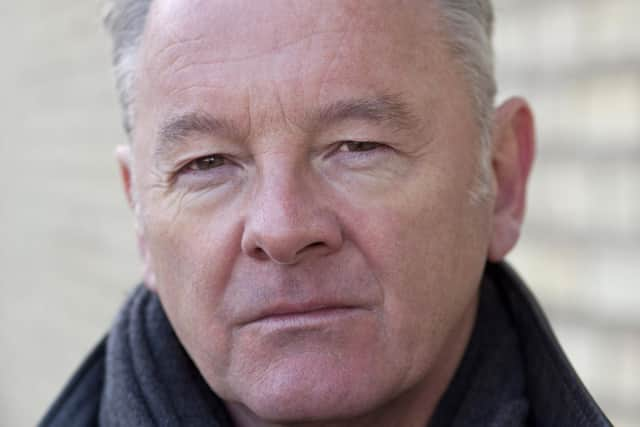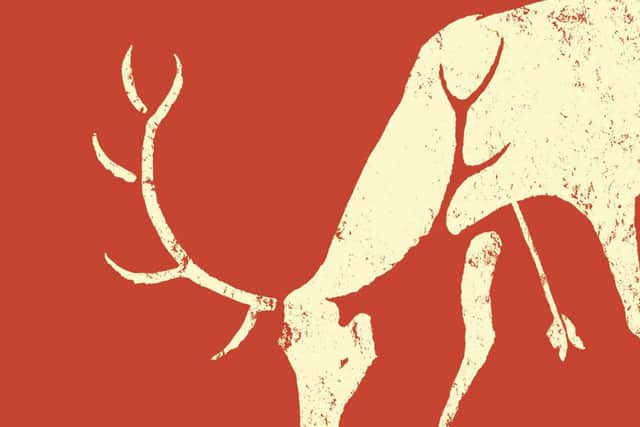Book review: Grimoire, by Robin Robertson


Robin Robertson certainly has a way with titles. Grimoire is a word to roll around the teeth; as it shifts from grim to moi to ire, and yet keeps its meaning as a book of spells.
It is a book which conjures up the Grimm Brothers, and at its opening offers the word “glamour”, a word associated with the supernatural. This is a book that will make you awaken at night.
Advertisement
Hide AdThroughout his career, Robertson has fashioned modern folk tales and was rightly acclaimed for the “verse novel”, The Long Take.


His poetry is unusual in that it is pointed – the glanced moment – and yet can be propelled narrative at the same time. Grimoire is a perfect encapsulation of both these talents.
In her introduction to it, Val McDermid says “if you love stories, you will love this book. If you think poetry is for softies, think again”. I could not agree more. It is hauntingly illustrated by Tim Robertson, whose sfumato shadows flit between the lines. Perhaps the best place to start is the beginning.
Games & Diversions Of Argyleshire does actually exist (Robert Craig Maclagan, 1901), but such is the nature of Robertson’s book that I doubted if it was actually real. The catch runs “a pin to see a pappy show / a pin to a see a die / a pin to see a wee man / running up the sky”. The combination of the Unheimlich, the nursery rhyme and the creepily local is the ideal overture to the book. But the next poem “Of Mùthadh / Mutability” adds another element.
The Gaelic word means two things; change but also decay. Pairing the Gaelic with a very Latinate word raises another influence, the Roman poet Ovid. His Metamorphoses is, when read again, a ghastly work of revenge and rage and rape.
The introductory poem sets the scene: “this book is for the taken… weird-set, ill-minted” and ends with beautiful horror “my mouth is full of stones… Tell my mother and father I am coming, tell them / I have not grown old”. The narrator figure is, or will be, a mountain hare, a mackerel, a sea-otter, a starling, an ear of corn; even a flame, water or its own ghost. This sense of mutation, of not being forced to be oneself, braids the whole book. In one of the early poems, the narrator attempts to escape destiny: this cannot be accomplished, not even with the trickiest of tricks.
Advertisement
Hide AdRobertson does something exceptionally impressive with language here, in that the book twists around Gaelic, Scots and English. It does not feel forced, and if it makes a reader check the index, then all to the good. But it is the ease of the switching that is remarkable. Sometimes Scots is used for rambunctious effect, as in WN Herbert’s Cabaret McGonagall, sometimes as a low, slow lament as in Kathleen Jamie’s recent work (the words sound as if they are already echoes). Robertson is somehow dapper in just using the right word in the right place for the right line.
The linguistic inventiveness would mean little or nothing if it did not come with an emotional truth. Robertson doesn’t coax, but he does lure the reader, right up to the point when you are punched in the guts. Take the end of “Inside Tobar nam Marbh” – “I go to the looking glass and see nothing: / just empty space and the other wall behind”. He has a capacity for terseness, as in the line “the crib lies empty still”.
Advertisement
Hide AdThere is something peculiar about the work’s mythology. Despite it deploying the “three languages of Scotland” (a phrase I hate: Polish and Urdu might count), the legends leap between classical Scottish atmosphere and English tradition.
Herne the Hunter seems apposite: one poem is a kind of variation on Actaeon, with the narrator turning into the beast he hunts, to “Under Beinn Ruadhainn” where a murder occurs – “no loss to the village” – of a person who was “horn-daft, he was, / havering and glaikit / and scaring the children.” But it also has deeper roots. It is not coincidental than Robertson has translated two works by Euripides, the Medea and The Bacchae.
Both plays feature murderous mothers and transformations, and in the stand-out poem here, “At Roane Head”, the “slack-jawed and simple, web-footed, / rickety as sticks” children who are “beglamoured”. It does not end happily. But the Devil is in the detail. Describing a chimney-flume as “a waterfall in reverse”, or in a later poem “the whole year / broken before it began”, or “watching lightning root in the far woods; / the sky blink” uses subtle alliteration and assonance to affecting effect. There is a precision in this from which younger poets might learn.
There is a steeliness to Robertson’s work. I would like an audio-book version, as in performance, he is dreadfully still as he tells us dreadful things. This is the poetry of the pause, not the applause. But there is one hand clapping here.
Grimoire, by Robin Robertson, is published by Picador, £14.99
A message from the Editor:
Thank you for reading this story on our website. While I have your attention, I also have an important request to make of you.
Advertisement
Hide AdThe dramatic events of 2020 are having a major impact on many of our advertisers - and consequently the revenue we receive. We are now more reliant than ever on you taking out a digital subscription to support our journalism.
To subscribe to scotsman.com and enjoy unlimited access to Scottish news and information online and on our app, visit https://www.scotsman.com/subscriptions
Joy Yates, Editorial Director